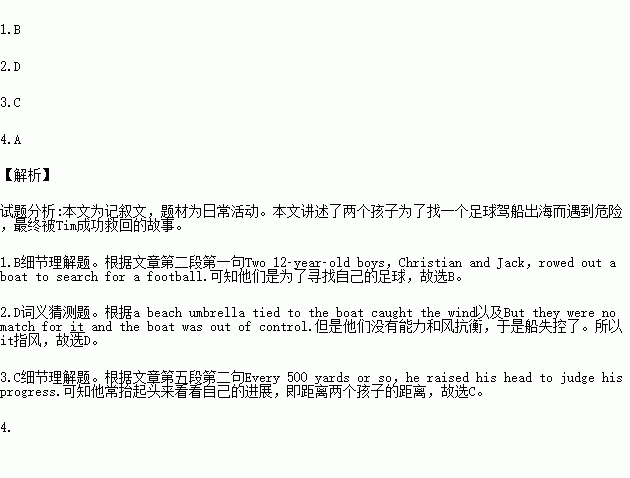题目内容
On a stormy day last August, Tim heard some shouting. Looking out to the sea carefully, he saw a couple of kids in a rowboat were being pulled out to sea.
Two 12-year-old boys, Christian and Jack, rowed out a boat to search a football. Once they’d rowed beyond the calm waters, a beach umbrella tied to the boat caught the wind and pulled the boat into open water. The pair panicked and tried to row back to shore. But they were no match for it and the boat was out of control.
Tim knew it would soon be swallowed by the waves.
“Everything went quiet in my head,” Tim recalls(回忆). “I’m trying to figure out how to swim to the boys in a straight line.”
Tim took off his clothes and jumped into the water. Every 500 yards or so, he raised his head to judge his progress. “At one point, I considered turning back,” he says. “I wondered if I was putting my life at risk.” After 30 minutes of struggling, he was close enough to yell to the boys, “Take down the umbrella!”
Christian made much effort to take down the umbrella. Then Tim was able to catch up and climb aboard the boat. He took over rowing, but the waves were almost too strong for him.
“Let’s aim for the pier(码头),” Jack said. Tim turned the boat toward it. Soon afterward, waves crashed over the boat, and it began to sink. “Can you guys swim?” he cried. “A little bit,” the boys said.
Once they were in the water, Tim decided it would be safer and faster for him to pull the boys toward the pier. Christian and Jack were wearing life jackets and floated on their backs. Tim swam toward land as water washed over the boys’ faces.
“Are we almost there?” they asked again and again. “Yes,” Tim told them each time.
After 30 minutes, they reached the pier.
1.Why did the two boys go to the sea?
A. To go boat rowing.
B. To get back their football.
C. To swim in the open water.
D. To test the umbrella as a sail.
2.What does “it” in Paragraph 2 refer to?
A. The beach B. The water
C. The boat D. The wind
3.Why did Tim raise his head regularly?
A. To take in enough fresh air.
B. To consider turning back or not.
C. To check his distance from the boys.
D. To ask the boys to take down the umbrella.
4.How can the two boys finally reach the pier?
A. They were dragged to the pier by Tim.
B. They swam to the pier all by themselves.
C. They were washed to the pier by the waves.
D. They were carried to the pier by Tim on his back.
 口算题卡加应用题集训系列答案
口算题卡加应用题集训系列答案
